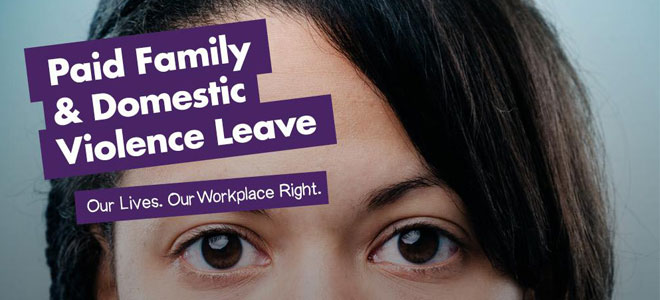Family and Domestic Violence Leave
From the first full pay period on or after 1 August 2018, all employees (including casuals) that are covered by an award will be entitled to five (5) days of unpaid family and domestic violence leave each year. Employees can take the leave if they need to deal with the impact of family and domestic violence and it’s impractical to do so outside their ordinary hours of work.
Family and domestic violence means violent, threatening or other abusive behaviour by an employee’s family member that:
- seeks to coerce or control the employee
- causes them harm or fear.
The usual definition of family member applies. This includes:
- an employee’s:
- spouse or former spouse
- de facto partner or former de facto partner
- child
- parent
- grandparent
- grandchild
- sibling
- an employee’s current or former spouse or de facto partner’s child, parent, grandparent, grandchild or sibling, or
- a person related to the employee according to Aboriginal or Torres Strait Islander kinship rules.
This leave is not cumulative and an employee’s entitlement begins upon the commencement of employment. The leave does not need to be taken all at once. It can be taken in multiple day blocks, single days or even part days.
It is important to note that like other types of unpaid leave, unpaid family and domestic violence leave doesn’t break an employee’s period of continuous service and also doesn’t count as service when calculating accumulated entitlements such as paid leave.
Employees can take the leave if they need to deal with the impact of family and domestic violence and it’s impractical to do so outside their ordinary hours of work. Examples include:
- making arrangements for their safety, or safety of a family member (including relocation)
- attending court hearings, or
- accessing police services.
Who does it apply to?
The new entitlement applies to all employees covered by an industry or occupation award. It doesn’t apply to employees who are:
- covered by Enterprise awards
- covered by State reference public sector awards
- covered by enterprise and other registered agreements
- award and agreement free.
Notice and evidence requirements
Employees wanting to take the new unpaid family and domestic violence leave entitlement need to let their employer know as soon as possible. This can happen after the leave has started. Employees also need to tell their employer how long they expect the leave to last.
As with other types of leave, an employer can ask their employee for evidence. Evidence requests are allowable for any period of leave, including those less than one full day. If the employee doesn’t provide the requested evidence, they may not get family and domestic violence leave. The evidence has to convince a reasonable person that the employee took the leave to deal with the impact of family and domestic violence.
Types of evidence can include:
- documents issued by the police service
- documents issued by a court
- family violence support service documents, or
- a statutory declaration.
Confidentiality
Employers have to take reasonably practicable steps to keep any information about an employee’s situation confidential. This includes information about the employee giving notice that they’re taking the leave and any evidence they provide. Employers are not prevented from disclosing information if:
- it’s required by law, or
- it’s necessary to protect the life, health or safety of the employee or another person.
Employers need to be aware that any information about an employee’s experience of family and domestic violence is sensitive. If information is mishandled, it could have adverse consequences for their employee. Employers should work with their employee to discuss and agree on how this information will be handled.
Confidential information, counselling and support for people impacted by domestic and family violence is available at https://www.1800respect.org.au
For any questions or for more information about family and domestic violence leave entitlements, please don’t hesitate to contact our office.






Leave A Comment
You must be logged in to post a comment.